
7 tell-tale signs your little one is teething
Share
One of the first big milestones of early childhood is the emergence of pearly whites! Most babies get their first tooth around six months, but it can vary quite a bit between infants. While we can’t predict exactly when that first tooth will emerge, learning to spot the early signs of teething can help you be better prepared for those teething woes! Here are a few helpful tips to spot teething in infants:
1: Excessive Drooling
Babies tend to drool more often than normal well over one or two months before the first tooth appears. It’s nature’s way of preparing for what’s to come! Keep those bibs handy and be prepared for constant wiping!
2. Frequent Grumpiness
Teething can cause discomfort and inflammation, making the baby more irritable. You may also notice fussiness during feeding, as the act of sucking can aggravate sore gums. Patience and extra cuddles can go a long way during this phase.
3. Disturbed Sleep
Teething pain often worsens at night when distractions are limited. If you and your baby are experiencing sleepless nights, teething could be the culprit. Try to maintain a soothing bedtime routine to help ease your baby’s discomfort
4. Gnawing or Nibbling
Gnawing or biting on whatever’s available could be a baby’s way of seeking relief during their teething phase. Counter-pressure through gnawing provides relief for those aching gums. This is the perfect time to introduce teethers, such as Gubbachhi’s range of all-natural neem wood teethers. Each one also comes with a handy muslin wipe cloth that can help with that messy baby drool easily!
5. Rubbing Ears and Cheeks
The gums, ears, and cheeks share nerve pathways, so discomfort in the gums during teething can radiate elsewhere. Therefore, babies rubbing their ears and cheeks may also be a sign of teething. Be mindful though, that this can also be a sign of ear infections, and not just teething - so keep an eye out for other symptoms as well.
6. Loose Stools
Apparently, all that excess drooling can actually result in loose bowel movements.(Messy can get messier!) Keeping your baby hydrated and ensuring proper hygiene is essential.
7. Slight Increase in Body Temperature
The inflammation caused by teething can result in a slightly elevated temperature. However, always consult with your pediatrician to rule out any deeper issues if your baby has a fever or any other concerning symptoms.
If you’re navigating the teething journey and looking for solutions, at Gubbachhi, we’ve got you covered. Explore our range of beautiful wooden teethers, inspired by the birds of India, that your little one is bound to love! These teethers not only provide relief but are also safe and eco-friendly, making them a perfect choice for your baby.
While teething can indeed be a challenging time for both babies and parents, by recognizing these early signs and being prepared, you can help make the process a bit smoother for everyone. Remember, every baby is different, so what works for one might not work for another. Trust your instincts and don't hesitate to seek advice from your pediatrician when needed.
Happy parenting!
Sources:
https://www.in.pampers.com/baby/teething/article/teething-symptoms-for-babies
https://www.healthline.com/health/parenting/when-do-babies-start-teething#typical-timing-and-order


